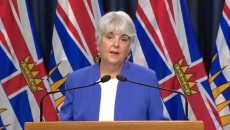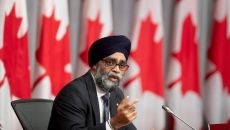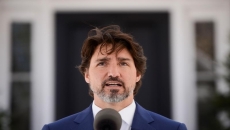The bitter political divide between Canada and China grew wider Wednesday after a British Columbia judge issued a ruling that went against the stern demands of the People's Republic.
China angrily denounced the decision by Justice Heather Holmes in the extradition case of Huawei executive Meng Wanzhou, who is wanted on fraud charges in the United States, as it called once more for her immediate release.
Canada held firm, calling for the release of its two "arbitrarily detained" Canadian men, and said it would continue to respect the independence of its judiciary from politics.
The upshot, said several analysts, is a deepening of a crisis in Sino-Canadian relations that would force the government to continue to seek allies in a dispute that has put Canada in the middle of a fight between two geopolitical giants.
Holmes ruled the allegations against Meng, that she lied to American banks to get Huawei business around sanctions against Iran, could constitute a crime in Canada. So her extradition case continues, and she will remain in the court's hands — on bail in a luxury Vancouver home.
Michael Kovrig, an ex-diplomat working for the International Crisis Group, and Michael Spavor, an entrepreneur who did business in North Korea, have been in Chinese prisons with no access to lawyers or their families since they were detained nine days after Meng's arrest by the RCMP in December 2018.
A statement by the Chinese Embassy in Ottawa again called for Meng's release and expressed "strong dissatisfaction" with Holmes's ruling.
"The United States and Canada, by abusing their bilateral extradition treaty and arbitrarily taking forceful measures against Ms. Meng Wanzhou, gravely violated the lawful rights and interests of the said Chinese citizen," the statement said.
"The purpose of the United States is to bring down Huawei and other Chinese high-tech companies, and Canada has been acting in the process as an accomplice of the United States. The whole case is entirely a grave political incident."
Foreign Affairs Minister Francois-Philippe Champagne said the decision was but one step in an independent legal process, one that is "transparent" for Meng.
"The government of Canada's top priority is and remains securing the release of Michael Kovrig and Michael Spavor, who have been arbitrarily detained for over 500 days," the minister said in a statement.
Kovrig's boss said he didn't want China to subject Kovrig to repercussions because the court ruling went against its wishes.
"I have no views on the ruling ... It should have no bearing whatsoever on Michael Kovrig's fate. He should not be made a casualty of the ruling in this case," Robert Malley, the head of the Washington-based International Crisis Group, said in an interview.
"His fate should never have been connected to hers. He should not be a casualty of whatever's happening between Canada, the United States and China," Malley added.
"From our perspective and the perspective of Michael's family, it's way past time that he be released, and there should not be any implication, any consequence from the court's ruling on his fate."
There are no easy answers for Canada as it moves forward with China but it needs to continue building international support to help it along, said Wendy Dobson, an author and China expert who is co-director of the Institute for International Business at the University of Toronto's Rotman School of Management.
"They should focus on the difficulties and the tensions in the relationship but they should also, as these groups are developed, push back against the things we don't agree with, like human-rights violations and the kind of political influence that has received a lot of attention in the Chinese-Australian relationship," Rotman said in an interview.
Garnett Genuis, an Alberta MP and the Conservative critic for Canada-China relations, said the rule of law is "foundational to our way of life" and he urged the Liberal government not to bend.
"It protects all of us. Unlike in the communist system in China, decisions like today's are based on law, not on politics," Genuis told The Canadian Press in a written statement.
But global security analysts said Canada may have to rebalance its foreign-policy interests against its adherence to the rule of law.
Ultimately, the Canadian justice minister will have the final say on the extradition, so the government could speed up that step rather than allow the case to wend its way through the courts for years, said Fen Hampson of the Norman Paterson School of International Affairs at Carleton University.
"It's not just a legal decision; it's a foreign-policy decision and it always has been," he said in an interview. "You can pick your poison: you can be bullied by the Americans, or you can be bullied by the Chinese. At the end of the day, you've got to look out for your own interests in this fight."
David Mulroney, a former Canadian ambassador to China, said the People's Republic faces growing challenges on the international stage that are to Canada's advantage: its ongoing dispute with the United States, the growing pressure on it over its handling of COVID-19, and a military standoff with India.
"Even China can only manage so many crises at one time."






